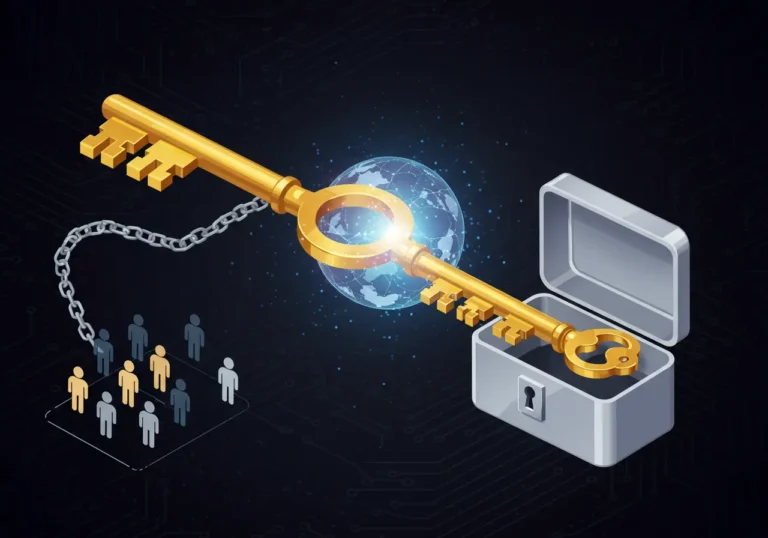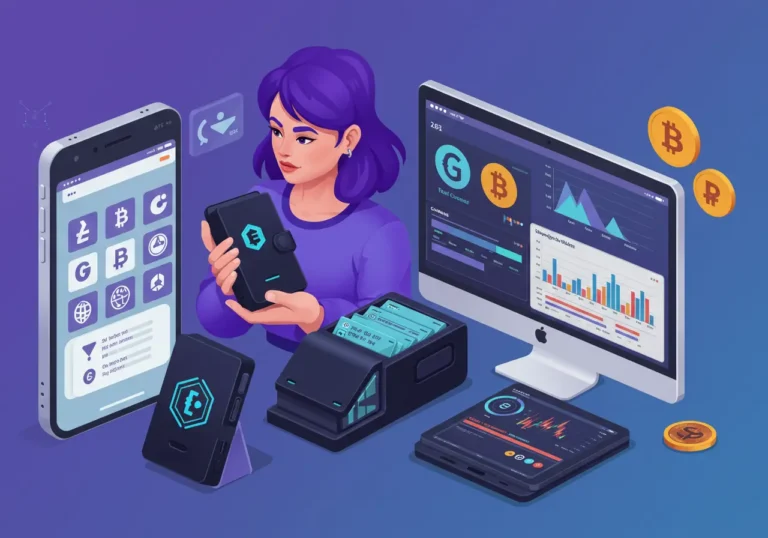Crypto Security Tools: Your Digital Armor (Simple & Strong)
Crypto security tools aren’t optional extras. They’re your digital armor. And the best part? You don’t need a degree in computer science to use ’em.
Let’s build your safety net together.

Start Here: Your Crypto Security “Front Door”
Think of your crypto like cash in your house. First step? Lock the dang door.
1. The Unbreakable Safe: Secure Hardware Wallets
Picture a tiny, super-tough safe that fits in your pocket. That’s a hardware wallet. It’s a physical gadget (like a fancy USB stick) that stores your crypto offline. Hackers can’t touch what’s not connected.
- Why it’s gold: Keeps your Bitcoin, Ethereum, or Dogecoin safe even if your laptop gets a virus.
- Keep it simple: Grab a Ledger or Trezor. These are the trusted names. They’re the real deal for secure hardware wallets for Bitcoin and other coins.
- My two cents: Treat it like your house keys. Know where it is, keep it dry, and never share its secret backup phrase! (More on that next).
2. Your “Oh Crap” Lifeline: Wallet Backups

What if your hardware wallet takes a swim in your coffee? Or your phone (with your software wallet) gets run over? Bless its heart. Your cryptocurrency wallet backup solutions save you.
- It’s NOT the gadget: Your lifeline is that secret list of words—your “recovery phrase.” Usually 12 or 24 random words like “apple,” “jungle,” “truck.”
- Do this TODAY: Write them down by hand on paper. Use pen! That little card in the wallet box? Perfect.
- Hide it like treasure: Tuck it in a fireproof safe. A lockbox. Your sock drawer? Nope. Never take a photo. Never email it. Never type it anywhere.
- Test it out: Before you load serious cash, practice restoring your wallet using just the words on a different device. Trust me, you’ll sleep better.
Daily Shields: Stop Sneaky Tricks
Hackers love shortcuts. They’d rather trick you than crack tech.
3. The Double Lock: Two-Factor Authentication (2FA)
Your password alone is like a screen door. 2FA slams a steel gate behind it.
- How it works: When logging into Coinbase, Binance, or any exchange, you need your password plus a temporary code. This code comes from:
- An App: Like Google Authenticator or Authy on your phone. Way safer than text messages.
- A Physical Key: A tiny USB-like thing (YubiKey). Tap it when you log in. Ironclad.
- Non-negotiable: Turn on two-factor authentication for crypto exchanges everywhere you touch crypto. No excuses.
4. The Scam Spotter: Anti-Phishing Tools
“Phishing” is when crooks dress up like your bank or crypto exchange. They send scary emails: “URGENT! Your account is LOCKED! Click HERE!” Clicking steals your login or seed phrase.
- Fight back:
- Browser Helpers: Tools like Pocket Universe pop up a warning if you land on a fake site. Lifesaving anti-phishing tools for crypto investors.
- Bookmark It: Always log in by typing the real website yourself or using your own bookmark. Never click login links in emails or texts!
- Your gut is key: Feeling rushed or suspicious? Stop. Open the real app yourself and check.
5. The Password Wizard: Password Managers
Using the same password everywhere? Like using one key for your house, car, and safety deposit box. Bad idea.
- Enter the manager: Apps like Bitwarden or 1Password make strong, unique passwords for every site. They remember them all.
- You remember ONE: You create one mega-strong “master password.” Make it a silly sentence: “PurpleTigerEatsRainbows42!”
- Total game-changer: No more forgotten passwords or risky repeats. Crypto password manager software keeps your keys safe and sane.
Next-Level Protection: Fort Knox Mode
Got more skin in the game? These add muscle.
6. The Shared Vault: Multi-Signature Wallets
Imagine a safe needing 2 keys out of 3 to open. That’s “multisig.”
- Why it rocks: Big transfers need approval from multiple people or devices.
- Perfect for:
- Couples sharing crypto savings.
- Protecting your nest egg – thieves can’t grab it with just one compromised key.
- Try it: Some hardware wallets do this. Or look at Gnosis Safe. Multi-signature wallets for digital assets = shared control, shared peace.
7. The Deep Freeze: Cold Storage
“Cold storage” means keeping crypto totally offline. Hackers can’t steal what they can’t touch.
- Hardware Wallets: Yep, they’re cold storage heroes.
- Paper Wallets (Be Careful!): Literally printing keys on paper. Super safe from hackers… but paper burns, fades, gets lost. Risky.
- For big holders: Cold storage solutions for Ethereum tokens or large Bitcoin stacks? Stick with trusted hardware wallets. Simpler. Safer.
Talking Safe: Keep Secrets Secret
Discussing crypto plans with buddies or a team?
8. The Private Line: Secure Communication Tools
Normal texts or emails? Like shouting in a library. Hackers snoop.
- Switch to: Apps like Signal or Telegram’s “Secret Chats.” Messages scramble. Only you and your pal read them.
- Why? Keeps wallet details, deals, or project secrets safe from eavesdroppers. Secure communication tools for blockchain projects are must-haves for teams.
9. The Invisible Cloak: Privacy Tools
Need to hide a sensitive file?
- Lock Your Files: Tools like Veracrypt (free!) create password-locked folders on your computer. Good for digital seed phrase backups (though paper is king!).
- Private Coins: Understanding coins like Monero (built for privacy) fits here too. Privacy-focused encryption tools for cryptocurrencies help obscure transaction trails.
Big Projects? Call the Pros
Launching something serious?
10. The Security Checkup: Professional Audits
Like a doctor for your crypto setup. Experts try to hack you nicely to find weak spots first.
- They check: Smart contracts, website security, wallet setups.
- Crucial for: Startups, exchanges, big projects.
- Worth it: Finds flaws before crooks do. Cybersecurity audit services for crypto companies build trust and prevent meltdowns.
Make It Habit: Your Security Routine
Tools gather dust without habits. Here’s your drill:
- Update Everything: Phone, laptop, wallet apps, browser. Updates patch security holes! Do it.
- Pause & Check: Urgent email? “Limited time offer?” Breathe. Verify outside the message. Scammers rush you.
- Double-Check Addresses: Sending crypto? Check the wallet address twice. One wrong letter = gone forever.
- Spread It Out: Don’t keep everything in one place. Hardware wallet for savings, a little in a trusted app for spending, exchange only for active trading.
- Zip Your Lips: Bragging online about your crypto stack? Like painting a target on your back. Stay quiet.
You Can Do This
Protecting your crypto isn’t about being paranoid. It’s about being smart. Start small:
- Get a hardware wallet.
- Turn on 2FA today.
- Use a password manager.
Crypto security tools are just helpers. Your real power? Staying alert and building good habits. Like learning to drive defensively. It becomes second nature.
Sarah? She rebuilt her crypto stash smarter. That sick feeling when she checks her wallet? Gone. Yours can be too.
Lock it down. Rest easy. Your digital future’s worth it.
Quick Security Checklist:
- Got your vault? Use a Secure Hardware Wallet (Ledger/Trezor).
- Wrote down your lifeline? Handwritten Wallet Backup Phrase, stored like treasure.
- Double-locked your accounts? ALWAYS use Two-Factor Authentication (2FA).
- Watching for fakes? Use Anti-Phishing Tools & never click sketchy links.
- Password game strong? Password Manager for unique, tough passwords.
- Big savings? Consider Multi-Signature Wallets or Cold Storage.
- Talking crypto? Use Secure Communication Tools (Signal/Secret Chats).
- Launching something? Get a Pro Security Audit.
- Habits on point? Update software, verify everything, check addresses twice, spread your crypto around, keep quiet online.
Security isn’t a chore. It’s peace of mind. Build yours brick by brick.
Table of Contents

Hello, I’m Edmilson Dias, founder of CoinBringer. I created this platform to guide people through the fast-moving world of cryptocurrency with clarity and safety. With years of research in blockchain and digital security, my goal is to translate complex topics into practical knowledge, offering reliable tutorials, safety insights, and guidance for both newcomers and experienced users.
Discover more from CoinBringer
Subscribe to get the latest posts sent to your email.







